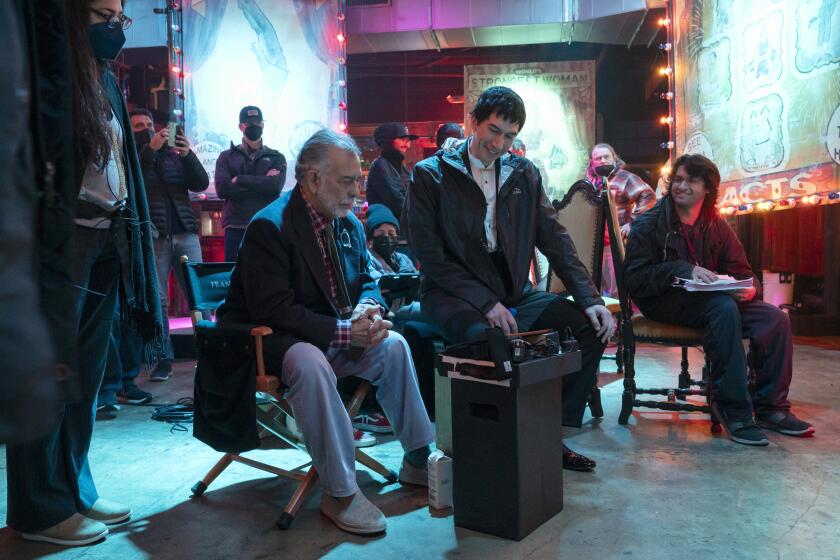Beijing Independent Film Festival: A real cliffhanger
BEIJING — The Beijing Independent Film Festival has a long history of absurd run-ins with the Chinese authorities, but this year’s edition opened in such a Kafka-esque manner it could have been penned by an indie scriptwriter.
It began in mid-August with festival director Wang Hongwei announcing to the audience assembled in the Fanhall Center for Arts that “due to unforeseen circumstances,” the opening film could not be screened. “Of course we all knew what those circumstances were,” said Jenny Man Wu, a director whose short feature “Some Sort of Loneliness” was on the festival roster. “It was ridiculous. There were plainclothes policemen in the audience, so conspicuous with their cameras, leather shoes and serious looks.”
Last year, after power was cut to the festival venue during the opening film, private screenings were organized in nearby artists’ homes. This time festivalgoers stuck around too, hoping a similar approach would be taken. By 10 p.m., as they gathered at the nearby Li Xianting Film Foundation, the atmosphere was one of a sit-in, with cross-armed and cross-legged festivalgoers squaring off against policemen.
Wang then announced that a bizarre compromise had been reached: Panel discussions would continue, but the films could be watched only by groups of two to five people. It would be a film festival — just without the mass screenings. One disappointed attendee staged an impromptu funeral march, with a festival poster standing in for the corpse.
Since its inception 10 years ago, BIFF — which shows movies that have not been approved by government censors — has faced government pressure and last-minute cancellations from venues wanting to avoid trouble. When the festival moved out of the city center six years ago to Songzhuang, an artist village on the edge of Beijing, film buffs had hoped that it would enjoy more freedom. However, in the last three years organizers have had regular visits from police and have been threatened with arrest and even demolition of their property.
“The Chinese Communist Party doesn’t understand culture. They think art should be a mouthpiece. They are afraid of anything uncertain, anything independent,” said Zhu Rikun, a former director of BIFF and the owner of the Fanhall Center for Arts. “There are films they haven’t even seen but will ban because they have sensitive titles. When it comes to the festival, they are scared of any event that brings together opinion leaders who do not work for the government.”
PHOTOS: Four female Chinese directors to watch
His view is shared by Man Wu, who said: “These films aren’t necessarily very political. They just don’t like films that don’t fit into their system. They’re scared of people getting together and thinking freely.”
Taking place in the national capital, in the shadow of central government offices, BIFF has been subject to more intense scrutiny than other independent cinema gatherings in China. But it is hardly the only such event that has had to cancel or move semi-underground. Independent festivals in Chongqing, Nanjing and Yunnan have all faced full or partial closures in the last year.
The Chongqing Independent Film and Video festival was almost guaranteed to face the wrath of the Chinese authorities after a movie by its program director, Ying Liang — “When Night Falls” — was banned and the filmmaker was threatened with arrest. But the Nanjing-based China Independent Film Festival (CIFF) was targeted last year despite its history of trying to toe the party line, even inviting local propaganda officials to attend its 2011 edition.
PHOTOS: Hollywood backlot moments
“CIFF has cooperated with local authorities, left the most politically sensitive films off the official program and even shown dragon-seal movies,” or films with the official government stamp of approval, said Karin Chien, president of Chinese independent film distributor dGenerate Films. “In the past, these concessions have allowed CIFF to continue to exist. But in the recent climate, CIFF has had to concede substantial components, like public forums and screenings, of their festival too.”
The greater difficulties that festivals have faced in the last year or so have coincided with a period of political transition. CIFF’s 2012 edition could not have been scheduled for a more sensitive time — November, the same month that China’s new rulers were announced at a Communist Party congress. Many in the film industry hoped that new President Xi Jinping would usher in a more open climate, but such expectations have so far proved illusory.
Despite the increasingly tough environment, many indie filmmakers refuse to be intimidated. After last year’s power cut, BIFF’s organizers this year brought their own generator, flashlights and batteries. Aside from the first night when the police presence made screenings impossible, BIFF’s organizers defied the authorities, showing some 70 films to more than 500 people over nine days until the closing party last Saturday.
PHOTOS: Celebrities by The Times
Organizers even hosted an awards ceremony; among the prize-winners was the outspoken artist Ai Weiwei, who was honored for his work “Peaceful Yueqing a documentary about the mysterious death of a dissident in small-town China.
“It’s possible that some people will stop making films,” said Wang, the festival director and an actor best known for his collaborations with director Jia Zhangke on films such as “Platform” and “Still Life.” “But those who are sure of themselves will continue. Maybe as the environment gets tougher, this will even force them to grow.”
“It doesn’t make us scared,” added Man Wu, who was the secretary of the Beijing Queer Film Festival, which was also held in August, spreading its screenings out to avoid police scrutiny. “Actually, if you put pressure on someone, it makes them want fight back. There’s no way the government can stop us watching these films in the long run. If we can’t have discussions, we’ll talk about movies online. If we can’t show them in one location, we’ll rent a bus and have screenings on the bus.”
PHOTOS: Fall movie sneaks 2013
The government’s actions might not dampen filmmakers’ spirits, but they can still have a negative impact, Wang said.
“This is an important platform for filmmakers to communicate directly with the audience and for people to gather, discuss and meet,” he said. “This exchange of information definitely has an influence on individuals’ creative work. Sure, we have the Internet as a means of communication now, but I believe in the power of face-to-face communication.”
More to Read
Only good movies
Get the Indie Focus newsletter, Mark Olsen's weekly guide to the world of cinema.
You may occasionally receive promotional content from the Los Angeles Times.












